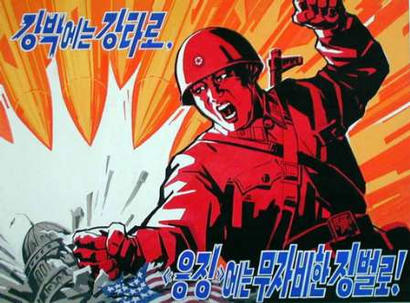Myths More Powerful Than Facts
I have a particular fascination with North Korea, a place I have never been to. (I visited South Korea for several months many years ago.) North Korea is such a global outlier in many ways that it may not have significance to anything modern. But the question it keeps challenging me with, is how does the country manage to spin information so that in effect everyone in North Korea goes along with its consensus? For that is the state of mind of the country: North Korea continues as is, because most North Koreans support it as is. For a great documentary exhibiting this consensus watch State of Mind.
Even better read this interview with the author of The Cleanest Race. Author Brian Myers was interviewed on NPR’s The Marketplace of Ideas, and the transcript appeared on 3quarksdaily.

Q: Koreans, in this view, are the “child race” who are so pure-blooded and so virtuous that they have to be protected from the evil world that surrounds them, specifically by the likes of Kim Il Sung and Kim Jong Il. Does that about get it?
A: That is pretty much the ideology. As I say, it’s something that a nine-year-old child in North Korea would have no difficulty understanding…
Even the North Koreans who escape from the country — and they are very small in number, those who choose to stay outside North Korea — still subscribe broadly to this racially-based way of looking at the world. They are still fans of Kim Il Sung, even if they think that Kim Jong Il is a bad man. It’s extraordinary, really, that you don’t have intellectual opposition to the regime in North Korea. We have very few refugees from North Korea who can be described as being political dissidents.
Q: Do the people of North Korea believe that the people of South Korea are essentially on an almost equal purity footing with them, and that they’re just another branch of the child race but have unfortunately fallen victim to the Americans?
A: That’s what they believe. Because the Korean people are racially, inherently good, it follows that the South Korean people are born just as good as the North Korean people are. But the North Korean propaganda apparatus makes a lot of the contaminating influence of the American presence in South Korea, the contaminating influence of American morals. The media in Pyongyang is also very critical of intermarriage between South Korean citizens and foreigners, especially between South Koreans and Americans. The North Koreans believe that South Koreans’ racial purity is in danger.
Q: One of the interesting things about the state media in North Korea’s view of the South is that they do not conceal the wealth of South Korea, which is just staggeringly greater than that of the North. It’s revealed without the population hemorrhaging to the South. How is that?
A: It’s because they have a very good way of spinning that wealth. The North Korean government says that the South Koreans are wealthy because Kim Jong Il’s military-first policy has kept the Americans from launching another devastating war on the peninsula. That’s one way in which they spin it, and they of course claim that the South Korean masses, for all their wealth, are deeply ashamed of living in a Yankee colony and want nothing more than to live under Kim Jong Il.
Q: There’s a line in the book that very much intrigued me, where you say that some South Koreans feel a twinge of guilt that the North is somewhat morally superior, or made the morally superior choice. How widespread is that actual feeling?
A: South Koreans are also nationalists, and they have a sort of sneaking respect for this country to the north which has thumbed it nose at the rest of the world with impunity. My own South Korean students at the university where I teach, many of them are quite happy that North Korea is pursuing a nuclear program, because they believe that, should unification ever come, those nuclear weapons would then become the possession of the Republic of Korea and Seoul.
Q: You write in the book that the North Korean state is actually quite careful to not contradict an average North Korean’s experience of their country. That’s fascinating to me, because does that mean they can acknowledge any sort of way in which life in North Korea is bad, but can go back to, “Well, America’s evil, and we’re pure”?
A: They can acknowledge a lot more than a Marxist/Leninist state could acknowledge. They can acknowledge that South Korean people have a much higher standard of living. On the other hand, there are things they really can’t acknowledge precisely because of their racialism. They cannot, for example, acknowledge the prevalence of crime in North Korea, because that is incompatible with the image of the Korean people as being uniquely pure. If your read North Korean newspapers, there is no mention at all of any kind of crime in North Korea. There are no real villains in North Korean popular culture either, because how could you have a North Korean villain? The kind of conflict you have in North Korean narratives is between a perfect character and a character who has perhaps some minor character flaws.


